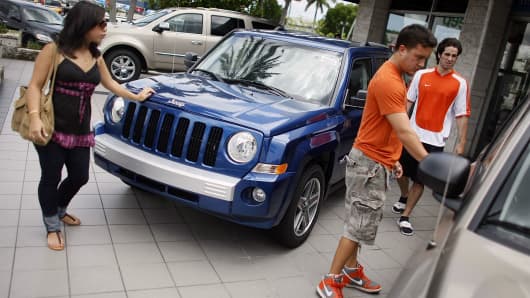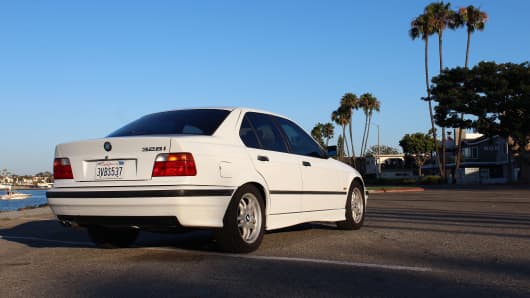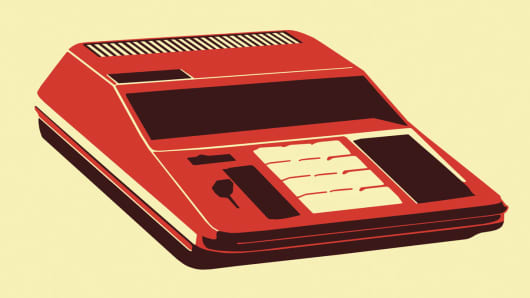
Getty Images
Customers look at a Jeep vehicle for sale on the sales lot of a Chrysler Jeep Dodge dealership in Miami.
Planning to buy a car? You could be driving for a long time before you're out of debt.
As interest rates rise and vehicles become more expensive, that new-car smell increasingly comes with larger loans and lengthier terms.
Americans now owe nearly $1.3 trillion in auto debt. In January 2019, the average interest rare on a new car was 6.19 percent, compared with 4.9 percent a year ago, according to Edmunds, which provides research on the car industry. The average monthly payment has swelled to $551, from $524.
Meanwhile, the typical term for an auto loan is now 69 months, up from 61 in 2010.
"Vehicle prices and interest rates are so high right now that consumers are facing the very real possibility of spending thousands of dollars more on a new vehicle than they did last time they purchased a new car," said Jessica Caldwell, the executive director of industry analysis at Edmunds.
However, you may be able to reduce your car debt. Here are some strategies.
Consider a used car

Source: Philip Reed
Philip Reed's 21-year-old BMW
Used cars are typically less expensive than new ones and so the loans for them are often smaller, said Philip Reed, an automotive writer at personal finance website NerdWallet.
"If you turn on the football game, you will be brainwashed into thinking you need a new car," Reed said. "People don't understand how reliable a good used car can be."
While the average vehicle on the road is around 12 years old, Reed said, a car's price tag can halve after just three years.
The average monthly loan payment for a used vehicle in January 2019 was $407, according to Edmunds.
Thoroughly vet the history of any used car you consider buying, Reed said. Using the vehicle identification number, located on the driver's side dashboard, you can check the car's history with the National Insurance Crime Bureau, CarFax or the National Motor Vehicle Title Information Center. You may also want to have the car inspected before you buy it, to make sure nothing was missed on the car's record.
Go to the dealership prepared

You should go to your bank or credit union and get pre-approved for an auto loan before you enter a dealership, said Rebecca Borne, senior policy counsel at the Center for Responsible Lending. "It puts the consumer in a better bargaining position," she said. "It forces the dealership down on the rate."
Borne also recommends "cross-shopping" at other dealerships to try to lock in the best price on a given car. Autotrader is one database of used and new cars.
Don't be sucked in by low monthly payments, Borne said. If you're able to make higher payments on a shorter loan term you'll save overall.
And resist the often unnecessary add-ons that many dealerships push, she added, such as extended warranties and additional insurance. "They give a windfall to the dealer without giving much benefit to the consumer," she said.
Look for deals

Getty Images
Be on the lookout for car-buying incentives that could save you money, including loans with zero-percent interest or cash-back deals, Reed said. You can learn about these offers on websites such as Edmunds and Kelley Blue Book, or directly with the car manufacturer.
Excellent credit is often needed to secure the zero-percent interest rate offers, Reed said, and they're becoming rarer. Still, it can't hurt to apply.
"Even if you fall short," he said, "there's a good chance you'll still beat current rates."
More from Personal Finance:
Wells Fargo, Bank of America offer help for clients hurt by the federal shutdown
He can't pick up his insulin because of the government shutdown. How workers are hurting
How to make sure spending doesn't trip up your New Year's resolutions